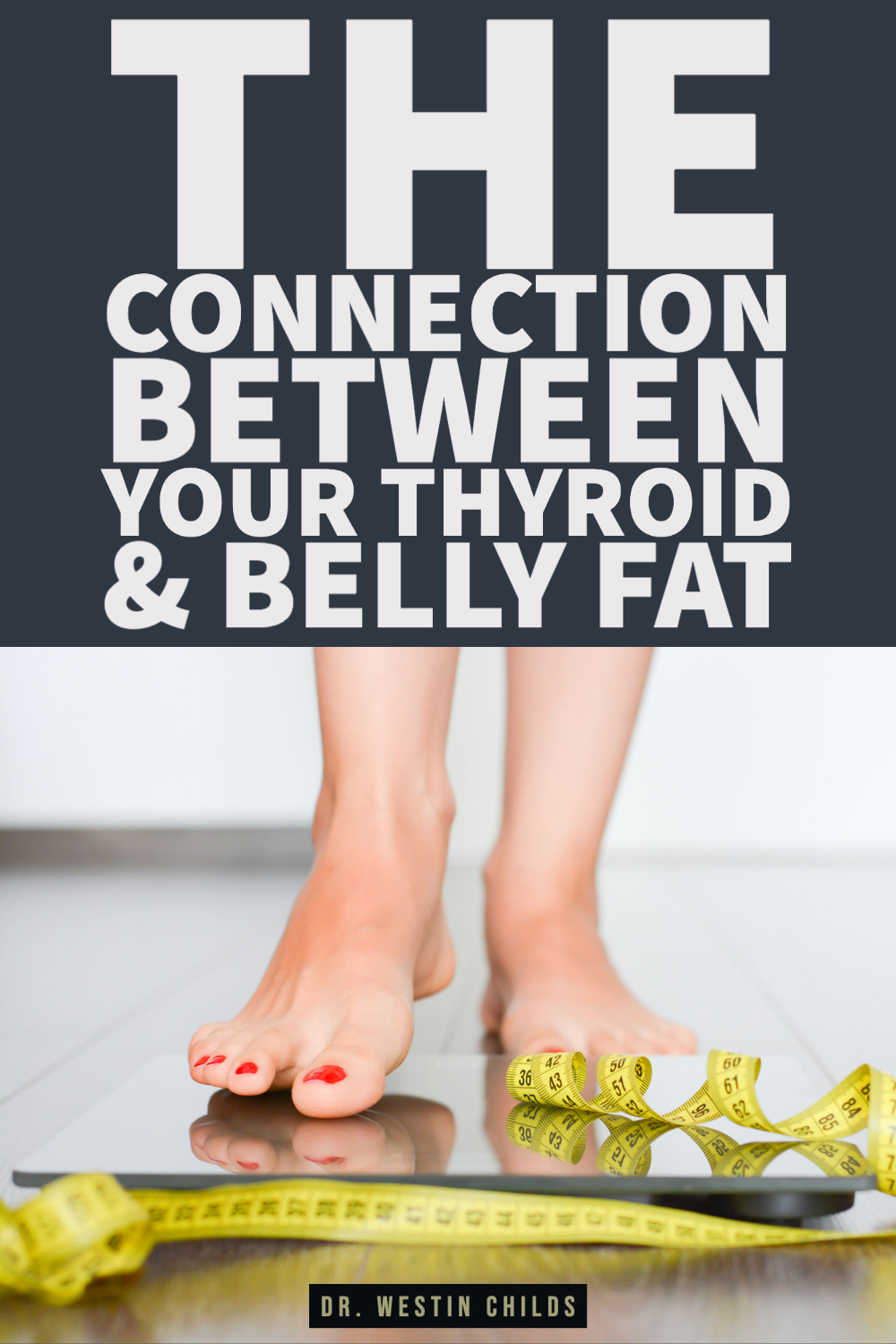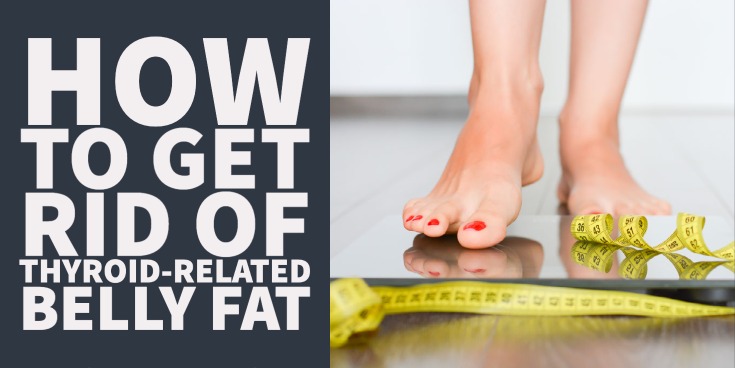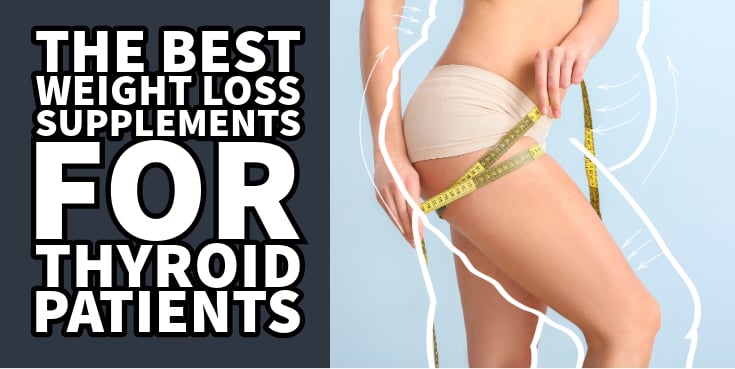Let’s face it:
Some fat is so stubborn that it feels almost impossible to get rid of.
And fat in the belly has led many a thyroid patient to the extreme depths of frustration and anger.
Can you relate?
Well, if you are dealing with stubborn belly fat then I have some good and bad news for you.
Let’s start with the good news:
The good news is that it’s not all in your head, there is something you can do about it, and there is a potential explanation for it.
The bad news is that there really isn’t a magical formula or secret combination of supplements or foods that you can eat which will effortlessly solve the problem.
That bad news isn’t all that bad, though, because it means there is something you can do about it.
It all starts with understanding what causes belly fat, though, and I can assure you that it’s probably not as straightforward as you might think.
The belly fat that thyroid patients get is going to be slightly different from the belly fat that the average person gets because of the influence that thyroid hormone has on your hormones (1), appetite (2), energy levels (3), and much more.

With this in mind, let’s talk more about the connection between thyroid problems and belly fat and how to solve it:
What Type of Fat Does Hypothyroidism Cause?
Let’s start with some basics.
All thyroid conditions have the potential to impact your body weight and fat mass, this is undisputed (4).
What is sometimes disputed (depending on who you talk to) is how thyroid dysfunction leads to weight gain and how to treat it.
In general, low thyroid states lead to weight gain and high thyroid states lead to weight loss.
This is because your thyroid helps to control and regulate your metabolism.
As thyroid function falls, your weight will increase.
This doesn’t mean that those with high thyroid function can’t gain weight because they certainly can, but it does mean that most of the time, the people struggling with weight gain who have a thyroid problem suffer from low thyroid or hypothyroidism.
And the general type of weight gain that these people experience is whole-body weight gain depending on the severity of their disease.
In a general sense, this means that if you have a low thyroid condition you are more likely to generate whole-body fat (fat all over your body) and not necessarily just in the belly or abdominal region.
But, and this is an important but, patients with low thyroid function are also susceptible to developing belly fat.
So in addition to generalized weight gain from hypothyroidism, you may also notice an increase in belly fat as well.
This occurs for 2 main reasons:
Thyroid dysfunction impacts cortisol which is a known and documented cause of abdominal fat (5).
And thyroid dysfunction also impacts insulin signaling which is another known cause of abdominal fat (13).
Even though thyroid dysfunction doesn’t always cause an increase in belly fat by itself, it definitely has the potential to cause it indirectly by altering the function of these two hormones.
DOWNLOAD FREE RESOURCES
Foods to Avoid if you Have Thyroid Problems:
I’ve found that these 10 foods cause the most problems for thyroid patients. Learn which foods you should avoid if you have thyroid disease of any type.
The Complete List of Thyroid Lab tests:
The list includes optimal ranges, normal ranges, and the complete list of tests you need to diagnose and manage thyroid disease correctly!
“Targeting” Thyroid-Related Weight Gain & Belly Fat:
There are two types of fat to think about if you are trying to target belly fat.
The first, subcutaneous fat, is the type of fat that you gain that is right underneath your skin.
This fat is relatively harmless (6) but it can result in the dimpling of the skin and the characteristic cellulite appearance that so many people aren’t fond of.
From an aesthetic perspective, the growth of this type of fat is not as concerning as the next type we are about to talk about.
The other type of that that you need to be more concerned about is called visceral fat.
Visceral fat is stored inside your body around organs, intestines, and the liver.
Based on all available evidence, visceral fat is also the worse kind of fat to develop because it is associated with a host of medical problems (7) including metabolic syndrome (8), diabetes (9), insulin resistance (10), stroke (11), heart disease (12), and more.

From the perspective of your belly, both visceral and subcutaneous fat contribute but it’s the visceral fat that contributes the most.
As fat accumulates around your organs and intestines, it pushes out your stomach which causes belly fat.
This process also makes cellulite and dimpling from subcutaneous fat more noticeable.
As a thyroid patient, you will be more susceptible to developing both subcutaneous fat and visceral fat owing to the thyroid’s normal responsibility of helping to regulate hormones like insulin and cortisol.
When these hormones are dysregulated, you will become much more likely to develop increased belly fat.
How do you resolve the problem?
Well, it’s harder than you might think because, from a physiologic perspective, you can’t exactly target an area of fat on your body very easily.
In general, the treatments and therapies that you use to help you lose weight will have an effect on your entire body, not just your belly.
Having said that, there are definitely some treatments that you can take advantage of which tend to be more effective at treating visceral fat as opposed to generalized fat and it is these therapies that I want to discuss right now.
#1. Do Your Best To Balance Cortisol.
Each of the treatments I’m about to discuss is important but perhaps the most important are the first two.
That’s because there’s a host of data that connects two hormone imbalances to the growth of visceral fat:
Cortisol dysregulation (usually high cortisol) and insulin resistance (usually from high blood sugar and elevated insulin levels).
Let’s start with the cortisol issue first:
The connection between cortisol and belly fat is so common that we even have a name for it:
Stress belly.

It’s been known for a very long time that high levels of stress make you much more likely to develop fat in your gut.
There’s no denying that.
The question is, why does it happen and how can you fix it?
When it comes to thyroid patients, we know why it happens.
And it’s because there is a strong connection between thyroid function and cortisol function (14).
In other words, if you have a thyroid problem then you are more susceptible to developing problems with cortisol.
In addition to that, you will be less resilient to stressful situations in general.
So if you took a thyroid patient and a healthy individual and put them under the same stress, the thyroid patient will experience more profound negative consequences from the stress compared to the healthy person.
This may seem intuitive but perhaps you haven’t completely appreciated its consequences.
This means for any given stressful event, of which I can guarantee you are being introduced to on a daily basis, your body will feel the effects more profoundly in both the short term and the long term.

Small stressors, like everyday types of stress, that would normally bounce right off of you, will now take a toll (15).
Both big and small stressors will continually add up in a multiplicative way which will eventually lead to cortisol problems.
These cortisol problems can be manifested as adrenal fatigue or as changes in your cortisol level.
In either event, the function of cortisol will be dysregulated and you will suffer the consequences like fatigue and abdominal weight gain.
So what can you do about it?
The first thing you need to do is optimize your thyroid (we will discuss this in more detail in #3) but in addition to optimizing your thyroid there are many other things you can do including:
- Testing your cortisol level – The first thing you should do is test your cortisol level to see if it’s a problem. Cortisol testing isn’t always accurate, though, so don’t hang your hat on the results. Most thyroid patients are fine getting a serum cortisol lab test. When you get your results look for values that are within range but either low normal or high normal and address those values as needed.
- Reducing your total exposure to stressful situations as often as possible – The next thing you want to do is reduce your exposure to stress (16) as much as possible. This may mean taking a hard look at your relationships, your work schedule, your sleeping schedule, and your day-to-day activities. Find those things which are causing stress and do your best to eliminate them. It won’t be possible to eliminate all forms of stress from your life but do your best to minimize them as much as possible.
- Increase your resilience to stress with meditation – Even though you can’t completely eliminate stress from your life you can improve your resiliency to stress (17). Certain treatments like meditation have been shown to make your body less reactive to stress which in turn improves your stress resiliency. This is an easy but often overlooked treatment.
- Desensitize your body to stress with dry brushing – Next, consider the treatment of dry brushing and frequent use of skin moisturizers. Taking care of your skin can send signals to your brain which are calming. In addition, these treatments also improve lymphatic flow and the quality of your skin (18). Don’t skip this easy treatment!
- Consider using adrenal adaptogen supplements – As an extra step, you can also consider the use of adrenal adaptogens. These are naturally occurring plant-based ingredients that help balance the stress response system. Adaptogens help your body adapt to stress which is where their name comes from. Some of my favorites for thyroid patients include ashwagandha, Rhodiola, and maca root.
- Consider using adrenal glandular supplements – Finally, you can also consider heavy-hitter supplements such as adrenal glandulars. Adrenal glandulars come from the adrenal glands of animals and they contain prohormones, enzymes, and proteins that are naturally found in the adrenal glands. It’s not exactly known how they work but patient experience (as well as my own experience) suggests that they are quite powerful for low-energy adrenal fatigue.
#2. Sensitize Your Body to Insulin & Reverse Insulin Resistance.
Just as important, if not more important, for targeting belly fat is insulin resistance.
Insulin resistance is incredibly common with as many as 50% of adults suffering from this condition (19) to some degree or another.

Why is this a problem?
Because just about every major health problem you can think of is made worse or directly associated with insulin resistance.
This includes conditions like metabolic syndrome, heart attack, stroke, cancer, obesity, and Alzheimer’s disease.
On top of these problems, it will also make you gain weight in your abdomen.
And, unfortunately, thyroid patients are at increased risk for developing this hormone-resistance syndrome.
This is because disordered thyroid states (both hyperthyroidism (20) and hypothyroidism (21)) interfere with insulin signaling which makes you much more likely to develop insulin resistance.
This also means that the average person will be able to tolerate foods differently than you will as a thyroid patient.
You’ve probably already noticed this, but if a healthy person and a person with thyroid disease were to eat the same food, it would negatively impact the thyroid patient more than the healthy person.
It sucks but it’s just the way that it is.
The good news is that there are plenty of documented treatments for treating and even reversing insulin resistance.
And if you catch it early enough you can prevent all of the nasty medical conditions that I listed above so these treatments should be a top priority for you as a thyroid patient, especially if getting rid of belly fat is something you are trying to do.
Here are your next steps if you feel insulin resistance may be contributing to your abdmoinal fat:
- Test your blood sugar, fasting insulin levels, and Hgb A1c – You have to know what you are dealing with and testing is the best way to figure that out! You can get a pretty good idea of the level of insulin resistance present in your body with some simple tests. These tests are covered by insurance and your doctor should have no problem ordering them.
- Manage your stress using the treatments in #1 – In addition to the treatments listed here, spend time and energy managing your stress as well! Just like there is a connection between your thyroid and insulin, there is a connection between stress and insulin (22). The more stress you are under the easier it will be for you to become resistant to insulin.
- Utilize intermittent and prolonged fasting – Fasting is one of the most powerful treatments you can use for weight loss and for reversing insulin resistance. There are so many different ways to fast so just pick the one that works best for your body and schedule. 24-hour fasts, intermittent eating windows, OMAD, and every-other-day fasts are some of my personal favorites.
- Decrease your carbohydrate consumption with a low-carbohydrate diet – It never hurts to cut back your consumption of processed foods as well as refined sugars and carbohydrates. I won’t spend much time here because you should already know this.
- Take advantage of prescription medications – Certain medications are incredibly powerful at sensitizing you to insulin and at helping with weight loss that they can almost be considered cheat codes. Medications like GLP-1 agonists fall into this group but you can also get some decent results with others like metformin, SGLT-2 inhibitors, and acarbose.
- Exercise regularly – Exercise is a must if you are trying to target belly fat and reverse insulin resistance! Any type will do but my favorites for thyroid patients include weight training and full-body workouts like yoga. Weight training builds muscle mass and improves metabolism while yoga builds flexibility and mobility.
- Use over-the-counter supplements – You can also take supplements to help augment all of the therapies I’ve listed above. Nutrients like berberine, alpha lipoic acid, fish oil, and glucomannan are very helpful and can be combined with medications and lifestyle changes.
These treatments are not only effective for reversing insulin resistance but they are also powerful weight loss treatments as well.
#3. Optimize Thyroid Function.
If losing weight is important to you then you must focus on optimizing your thyroid function.
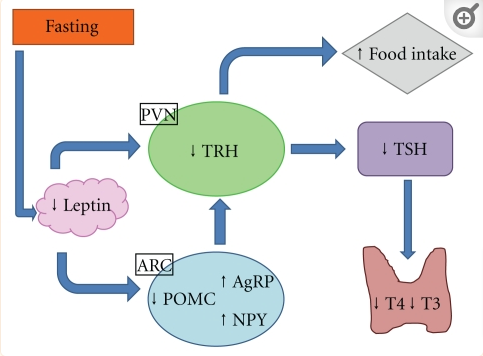
The term thyroid function is important here because it refers to how well your body is able to utilize thyroid hormone.
You might assume that as long as your body produces thyroid hormone everything is all good but that isn’t the case.
There are so many things that can interfere with thyroid function that just producing thyroid hormone isn’t enough.
You need to not only make sure that your thyroid is able to produce thyroid hormone but also that it can:
- Properly convert T4 thyroid hormone into T3, T2, and T1 – The thyroid conversion process is primarily mediated through a set of enzymes called deiodinase enzymes. Their function is controlled by a combination of genetic factors and inputs from your lifestyle. They can sometimes also be influenced by the use of certain nutrients.
- That your cells are receptive and sensitive to the thyroid hormone that it produces and converts – Just like any other hormone in the body, your cells can become resistant to the effects of thyroid hormone. You can treat thyroid resistance in the same way that you can treat insulin resistance even though the treatments and therapies are different.
- And that the other organs involved in thyroid conversion and function are working properly – Other organs in your body like the liver and gut are critical for proper thyroid function! If you have liver problems or gut problems these must be addressed in order for your thyroid to function at its peak level.
Thyroid optimization is primarily done by taking supplements, reducing inflammation, and taking advantage of lifestyle changes.
There’s a lot of overlap here but eating a whole-food diet, exercising regularly, sleeping deeply, and managing your stress are all important.
#4. Use Thyroid Medication (If Necessary).
Believe it or not, you can do a lot to improve your thyroid without the use of thyroid medications.
Many thyroid patients lean on their thyroid medication like a crutch and forget that there are so many natural treatments available to them to improve how well their thyroid is functioning.
Pretty much no matter what, you can influence and improve your thyroid with the use of these treatments but there will always be situations in which they aren’t enough by themselves.
When this happens, the use of prescription and supplemental thyroid hormones is necessary.
Thyroid medication can be critical and necessary for fat loss because of the impact that your thyroid has on other hormones in your body (like insulin and cortisol) and the impact that it has on your metabolism.
Try losing weight with a metabolism that is functioning at 70% of normal and see how easy it is to lose weight.
It’s possible but incredibly difficult, and why would you subject yourself to this scenario if you don’t have to?
The use of thyroid medication can take your floundering metabolism (due to decreased thyroid function) and bring it up to a more normal level making your weight loss efforts much more effective.
It’s not correct to think of thyroid medication as a weight loss medication but it does have the effect of making weight loss easier.
If you are trying to get rid of belly fat (or just fat in general), these are some of the more effective thyroid medications and hormones to look at:
- Any thyroid medication that contains T3 including Cytomel, liothyronine, SR T3, and NDT
- T2 thyroid hormone which is available over the counter in supplement form
- Cleaner T4-only thyroid medications like Tirosint and Tirosint-Sol
If you are already taking thyroid medication then you can consider swapping to some of these options if your current regimen isn’t working.
If you aren’t taking thyroid medication and you’ve tried everything else, or if you just want some extra help, then consider the options above.
#5. Optimize Your Eating Habits.
While you can’t always eat yourself to a normal weight, your diet is definitely important.
It turns out that the foods that you eat, how frequently you eat, and when you don’t eat, can have an impact on your hormones, especially those that are responsible for belly fat.
If you are trying to cut down on abdominal fat here are a few things to consider:
- Food quality – To optimize food quality, focus on whole foods and cut out processed foods as much as possible. Meals that are whole-food based result in more caloric burn compared to processed foods, at least according to one study (23)(see image below). This alone will provide massive benefits for your body and hormones but you can take it a step further by cutting out seed oils and vegetable oils in favor of cold-pressed virgin oils. As needed, you may also benefit from cutting out specific food groups that may be personally inflammatory to your body such as gluten, dairy, and soy. You can also experiment with non-GMO foods, organic foods, and meats and fish that are grass-fed or wild-caught.
- Food quantity – Food quantity refers to the total volume of food that you consume each day and with each meal. You never want to consciously reduce your calories as a thyroid patient but there are things you can to do fill your stomach up with less calorically dense foods. Drinking plenty of water each day, especially with meals, and consuming plenty of vegetables can help you do this. No matter what, do your best to avoid overeating or letting your cravings guide your food choices as these will only set you back.
- Macromolecule ratio and priority – The three macromolecules are fat, protein, and carbohydrates. Most people focus primarily on carbohydrates and then fit in foods as needed. It’s often better to focus on protein and fat and then naturally allow your carbohydrate intake to fall where it may. Fats and protein are very satiating (24) and their consumption will cause you to naturally decrease your carbohydrate intake without any conscious effort on your part.
- Fasting schedule – As mentioned above, fasting is very important for weight loss and hormone balance. See my previous comments for more information.
- Macromolecule consumption throughout the day – If you are trying to address adrenal-related belly fat or adrenal fatigue-related weight gain, you may get more benefit from consuming carbohydrates later in the day as opposed to the morning. You don’t have to shift your total carbohydrate intake for this to be effective, you just have to alter when you consume them.
- Meal frequency – Finally, meal frequency can play a role if insulin resistance is the primary cause of your weight gain. Many people benefit from consuming larger meals less frequently (25) but there’s no hard or fast rule here, so just play around with how often you eat and your portion sizes to figure out what works best for you.
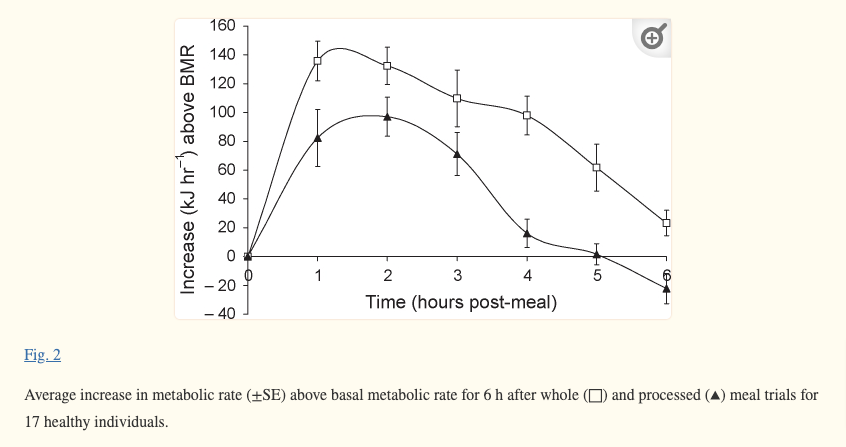
There’s a lot you can do with your diet and the foods that you eat but the name of the game here is trial and error.
You have years and years to figure out what your body needs as far as food is concerned so get started!
Final Thoughts
There’s no question that there is a connection between thyroid function and weight gain, including abdmoinal weight gain.
While you can’t always target belly fat specifically, the treatments listed in this article can help you target fat loss more generally with an emphasis on the causes that contribute the most to belly fat.
All of the treatments I’ve listed here have the potential to not only help your weight but to also improve your overall health as well as your thyroid health.
So if you’ve been suffering from thyroid-related symptoms including weight gain or hormone imbalances, don’t delay in getting started.
Now I want to hear from you:
Were you aware of the connection between thyroid dysfunction and abdmoinal weight gain?
How much of a role do you feel that your thyroid is playing in your overall weight?
Where do you personally store your fat? Is it in your abdomen or some other part of your body?
Are you planning on implementing any of the treatment strategies that I’ve listed here? Why or why not?
Leave your questions or comments below to keep the conversation going!
Scientific References
#1. ncbi.nlm.nih.gov/books/NBK500006/
#2. ncbi.nlm.nih.gov/pmc/articles/PMC3112506/
#3. pubmed.ncbi.nlm.nih.gov/22989469/
#4. ncbi.nlm.nih.gov/pmc/articles/PMC4911848/
#5. pubmed.ncbi.nlm.nih.gov/27345309/
#6. ncbi.nlm.nih.gov/pmc/articles/PMC6702693/
#7. ncbi.nlm.nih.gov/pmc/articles/PMC3473928/
#8. ncbi.nlm.nih.gov/pmc/articles/PMC4268163/
#9. ncbi.nlm.nih.gov/pmc/articles/PMC4800358/
#10. pubmed.ncbi.nlm.nih.gov/30398218/
#11. pubmed.ncbi.nlm.nih.gov/30612535/
#12. ncbi.nlm.nih.gov/pmc/articles/PMC5599249/
#13. pubmed.ncbi.nlm.nih.gov/8621015/
#14. ncbi.nlm.nih.gov/pmc/articles/PMC3520819/
#15. ncbi.nlm.nih.gov/pmc/articles/PMC6430278/
#16. ncbi.nlm.nih.gov/books/NBK513300/
#17. ncbi.nlm.nih.gov/pmc/articles/PMC3573269/
#18. ncbi.nlm.nih.gov/pmc/articles/PMC3114606/
#19. uab.edu/news/research/item/12289-uab-researchers-find-that-40-percent-of-young-american-adults-have-insulin-resistance-and-cardiovascular-risk-factors#:~:text=Research %26 Innovation-,UAB researchers find that 40 percent of young American adults,resistance and cardiovascular risk factors&text=A study conducted by UAB,is common among young adults.
#20. ncbi.nlm.nih.gov/pmc/articles/PMC3034962/
#21. ncbi.nlm.nih.gov/pmc/articles/PMC8963174/
#22. ncbi.nlm.nih.gov/pmc/articles/PMC9561544/
#23. ncbi.nlm.nih.gov/pmc/articles/PMC2897733/
#24. pubmed.ncbi.nlm.nih.gov/18469287/
#25. ncbi.nlm.nih.gov/pmc/articles/PMC4079942/
